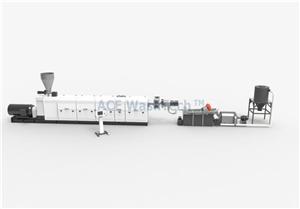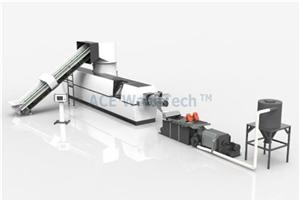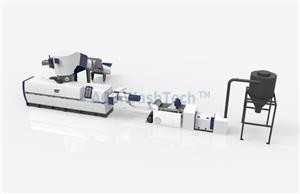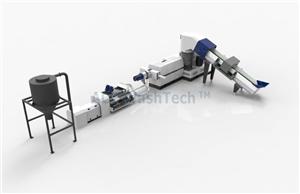Buy Low Cost PE Film Agglomerator washing drying line price
PE Film Agglomerator washing drying line
Agricultural films are heavier used around the world. They protect crops from bad weather, pests and diseases, but when they enter the waste stream, they pose many challenges for recyclers. Starlinger, an Austrian company, is addressing these issues and bringing recycled products to the top of the value chain.
In 2013, 510,000 tonnes of agricultural filmweres were sold in Europe, most of them in Spain (95,000 tonnes), Italy (80,000 tonnes) and France (55,000 tonnes). Other major users are Germany, the United Kingdom and Poland.
Thin-film plastics account for the largest proportion of agricultural applications, accounting for about 70%, mainly made of low density polyethylene (LDPE). China's property market has also been growing steadily over the past decade.
However, the need to recover these films is becoming increasingly important as many countries impose restrictions on landfills and more and more agricultural films enter the waste stream each year. This is also a market of increasing interest in Starlinger, the Austrian manufacturer of plastic recycling equipment.
Challenges
Although countries such as Germany, Spain and the UK have implemented recycling schemes, they face many challenges in recycling agricultural films in closed-loops. The most important of these is pollution.
Low Cost PE Film Agglomerator
Elfrid Hull, general manager of Starlinger Recycling Technologies, said the cleaning process for recycled materials was "extremely critical". One of the challenges here is that because waste films are often pressed into bundles for transport, it is difficult to determine the type and extent of contamination. Solid and/or abrasive contaminants must be removed through special melting filtration prior to granulation, and organic matter on the film may have begun to decompose.
Water content also poses a challenge to recycling due to different storage conditions. Humidity from external storage and/or washing requires special pre-drying. Depending on the moisture, different drying methods, such as ventilation or air flushing, must be used. In this case, due to very thin material and larger surfaces, thermal drying is very energy-intensive.
"Compared to tearing a PET bottle, when you tear it into a thin sheet, it breaks, sometimes it forms a pocket with moisture, and there may be some contaminants," Hell told WMW.
Technology
To meet these challenges, Starlinger has launched the recoSTAR Dynamic Recycling Series, a follow-up to the recoSTAR basic series. The new machine is designed to handle high-polluting and washed post-consumer films.
Depending on the needs of the application, the production line can be equipped with various types of degassing devices. Examples include integrated but independent C-VAC modules, discontinuous and continuous melt filters, and four different types of granulation machines.
Buy pe film washing drying line price
In order to obtain the high-quality particles required for applications such as injection molding and film extrusion, the melt requires a high degree of purification. Depending on the type and amount of pollutants contained in the melt, the gas creates a foam in the melt, trapping the air in the particles.
"An important goal of this comprehensive bill is to involve every part of our health care system in reducing opioid abuse," said Senator John F. Keenan. He is the vice chairman of a Special Committee of the Senate that addresses the state's opioid problem.
I'm proud that Massachusetts has taken this step. "
More than $1 billion in surplus drugs are thrown into trash cans, flushed or sent to medicine cabinets each year. Drugs left at home may enter the hands of children and potential drug users. Prescription drug abuse is the fastest growing drug problem in the United States. Last year, 1,256 people died in drug-related accidents in Massachusetts. Over-the-counter and prescription drugs can contaminate waterways and drinking water supplies when washed out or thrown into a trash can.
"Our research shows that drugs from domestic wastewater eventually enter our waterways and end up in our drinking water supply," said Laurel Schaider, a research scientist at the Silent Spring Institute in Newton, Massachusetts. "Preventing unwanted and expired drugs from being discarded or flushed into sewers will help keep them out of the environment, and drug recycling programs can achieve this goal." "
This subsidy runs counter to traditional analysis. Are they free? Conservative? Free market? Is it pro-business? Domain? The meaning of these two words conflicts with each other, driven by the global economy and social safety nets. If other countries offer such packages to attract manufacturers, the U.S. government is refusing to go this way to promote a "free market."




